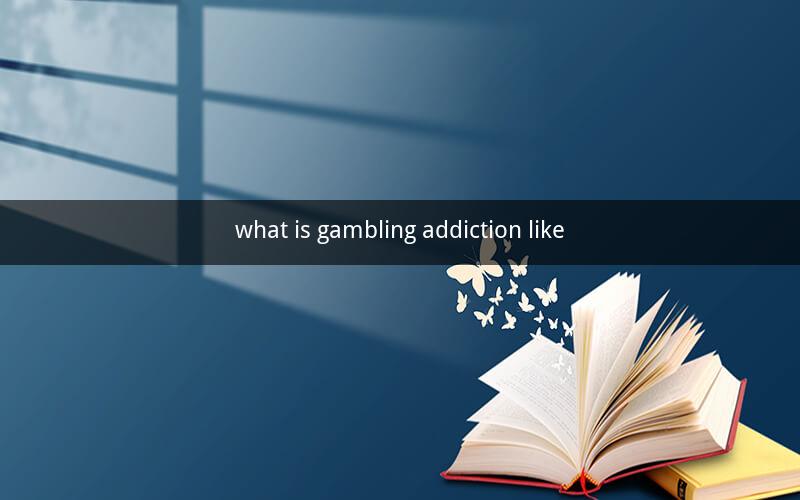
Directory
1. Introduction to Gambling Addiction
2. Signs and Symptoms of Gambling Addiction
3. Psychological Effects of Gambling Addiction
4. Sociological Impacts of Gambling Addiction
5. Treatment and Recovery Options
6. Prevention Strategies
7. Conclusion
1. Introduction to Gambling Addiction
Gambling addiction, also known as gambling disorder, is a serious condition that affects individuals' lives in various ways. It is characterized by an uncontrollable urge to gamble, despite the negative consequences that it may bring. This addiction is a form of impulse-control disorder and can be categorized into different types, such as problem gambling, pathological gambling, and compulsive gambling.
2. Signs and Symptoms of Gambling Addiction
Identifying the signs and symptoms of gambling addiction is crucial in seeking appropriate treatment. Some common signs include:
- Continuously increasing the amount of money and time spent on gambling activities.
- Feeling restless or irritable when not gambling.
- Making repeated unsuccessful attempts to control, cut back, or stop gambling.
- Lying to family, friends, or therapists about the extent of gambling.
- Using gambling as a way to escape problems or negative emotions.
- Prioritizing gambling over other responsibilities, such as work, family, and social activities.
3. Psychological Effects of Gambling Addiction
Gambling addiction can have severe psychological effects on individuals. Some of these effects include:
- Depression: As individuals continue to lose money and face the consequences of their actions, they may develop feelings of depression and hopelessness.
- Anxiety: The fear of losing money and the pressure to maintain the addiction can lead to increased anxiety levels.
- Guilt and shame: Individuals may feel guilty and ashamed for their actions, which can further exacerbate their psychological distress.
- Post-traumatic stress disorder (PTSD): Experiencing the consequences of gambling addiction, such as financial ruin and damaged relationships, can lead to PTSD symptoms.
4. Sociological Impacts of Gambling Addiction
Gambling addiction can have significant sociological impacts on individuals, families, and communities. Some of these impacts include:
- Financial ruin: Individuals with gambling addiction may go into debt and lose their homes, cars, and other possessions.
- Damage to relationships: The addiction can strain relationships with family and friends, leading to isolation and alienation.
- Work-related issues: The time and energy spent on gambling may affect an individual's job performance, leading to loss of employment.
- Increased crime rates: In some cases, individuals with gambling addiction may turn to crime to fund their gambling habits, leading to increased crime rates in their communities.
5. Treatment and Recovery Options
Treating gambling addiction is essential to prevent further negative consequences. Some treatment and recovery options include:
- Therapy: Cognitive-behavioral therapy (CBT) and other forms of therapy can help individuals recognize and change their gambling behaviors.
- Support groups: Joining support groups, such as Gamblers Anonymous, can provide individuals with a sense of community and support during their recovery journey.
- Medication: Some individuals may benefit from medication, such as antidepressants or mood stabilizers, to manage symptoms of depression or anxiety.
- Residential treatment programs: These programs provide individuals with a structured environment and support to address their gambling addiction and underlying issues.
6. Prevention Strategies
Preventing gambling addiction involves promoting awareness and education about the risks associated with gambling. Some prevention strategies include:
- Education: Teaching individuals about the potential dangers of gambling can help them make informed decisions.
- Responsible gambling campaigns: Encouraging individuals to gamble responsibly and set limits can reduce the likelihood of developing an addiction.
- Early intervention: Identifying and addressing gambling problems early on can prevent the addiction from worsening.
7. Conclusion
Gambling addiction is a serious condition that can have far-reaching consequences. By recognizing the signs and symptoms, seeking appropriate treatment, and implementing prevention strategies, individuals can overcome their addiction and regain control over their lives.
Questions and Answers
1. What are the primary signs of gambling addiction?
- Signs include increasing the amount of money and time spent on gambling, lying about gambling activities, and prioritizing gambling over other responsibilities.
2. How does gambling addiction affect an individual's psychological well-being?
- Gambling addiction can lead to depression, anxiety, guilt, shame, and PTSD symptoms.
3. What are the sociological impacts of gambling addiction on individuals and communities?
- Gambling addiction can result in financial ruin, damaged relationships, job-related issues, and increased crime rates.
4. What treatment options are available for gambling addiction?
- Treatment options include therapy, support groups, medication, and residential treatment programs.
5. How can education help prevent gambling addiction?
- Education about the risks associated with gambling can help individuals make informed decisions and reduce the likelihood of developing an addiction.
6. What is the role of responsible gambling campaigns in preventing addiction?
- Responsible gambling campaigns encourage individuals to set limits and gamble responsibly, which can help reduce the risk of developing an addiction.
7. How can early intervention help address gambling addiction?
- Early intervention allows individuals to seek treatment and support before their addiction worsens, making it easier to overcome.
8. What are the potential side effects of medication used to treat gambling addiction?
- Potential side effects may include dizziness, dry mouth, nausea, and sexual dysfunction.
9. How can support groups assist individuals in recovering from gambling addiction?
- Support groups provide individuals with a sense of community and support, helping them navigate the challenges of recovery.
10. What is the importance of residential treatment programs for gambling addiction?
- Residential treatment programs offer a structured environment and support to address the addiction and underlying issues, increasing the likelihood of successful recovery.